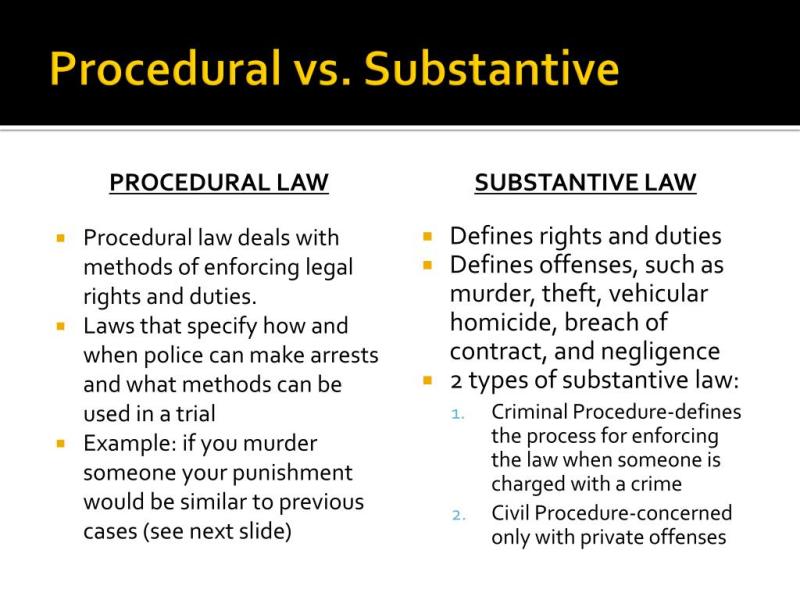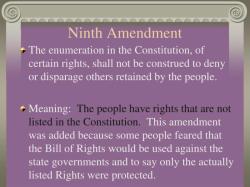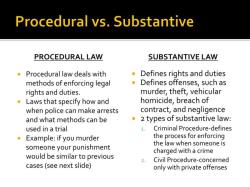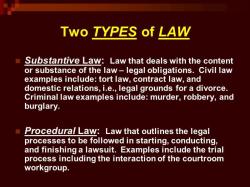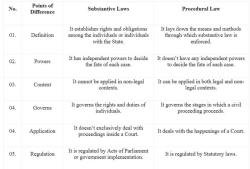What are the substantive laws and procedural laws?
Substantive law and procedural law are two fundamental branches of law that serve distinct purposes within the legal system:
Substantive Law:
- Definition: Substantive law defines and regulates the rights and obligations of individuals and entities. It sets out the principles and rules that govern conduct, establish legal rights, and create legal relationships.
- Focus: The primary focus is on the substance or content of the law, addressing issues such as rights, duties, and legal remedies.
- Examples: Criminal law, contract law, property law, and tort law are all examples of substantive law. These laws define what is considered a crime, the elements of a valid contract, property rights, and civil wrongs.
Procedural Law:
- Definition: Procedural law outlines the methods and processes used to enforce and protect the rights established by substantive law. It governs the procedures for handling legal disputes, from the initiation of a case to its resolution.
- Focus: The primary focus is on the procedures and mechanisms involved in legal proceedings, ensuring fairness, consistency, and the orderly resolution of disputes.
- Examples: Civil procedure, criminal procedure, and evidence rules are examples of procedural law. These laws dictate how cases are filed, the steps taken during a trial, and the admissibility of evidence.
In summary, substantive law defines rights and duties, while procedural law outlines the processes and steps to enforce and protect those rights. Together, they form the foundation of the legal system, providing a comprehensive framework for resolving legal issues.
Differentiating substantive laws from procedural laws
The key difference between substantive law and procedural law boils down to their focus:
- Substantive law defines rights and obligations: It tells you what conduct is legal or illegal, and what remedies are available for violations. Think of it as the "what" of the law.
- Procedural law governs how those rights and obligations are enforced: It lays out the rules and processes for resolving legal disputes and carrying out substantive law. Think of it as the "how" of the law.
Here's a table summarizing the key differences:
| Feature | Substantive Law | Procedural Law |
|---|---|---|
| Focus | Defines rights and obligations | Governs legal processes |
| Examples | Contract law, criminal law, property law | Rules of evidence, filing deadlines, trial procedures |
| Outcome | Determines who wins or loses a case | Ensures fairness and efficiency in legal proceedings |
| Specificity | Can be broad or specific, depending on the area of law | Usually detailed and technical, with precise rules |
Here are some analogy metaphors to help you understand the distinction:
- Sports game: Substantive law is the rulebook defining fouls and scoring rules. Procedural law is the playbook outlining how the game is played, from timeouts to penalties.
- Recipe: Substantive law is the list of ingredients needed for a dish. Procedural law is the set of instructions on how to combine those ingredients to cook the dish correctly.
- Building a house: Substantive law specifies the building codes and safety regulations. Procedural law outlines the permitting process, inspections, and construction methods.
It's important to remember that both substantive and procedural law are crucial for a well-functioning legal system. Substantive law defines the rights and wrongs, while procedural law ensures that those rights and wrongs are determined fairly and efficiently. They work together to provide a framework for resolving legal disputes and upholding the rule of law.
I hope this clarifies the differentiation between substantive and procedural laws!
